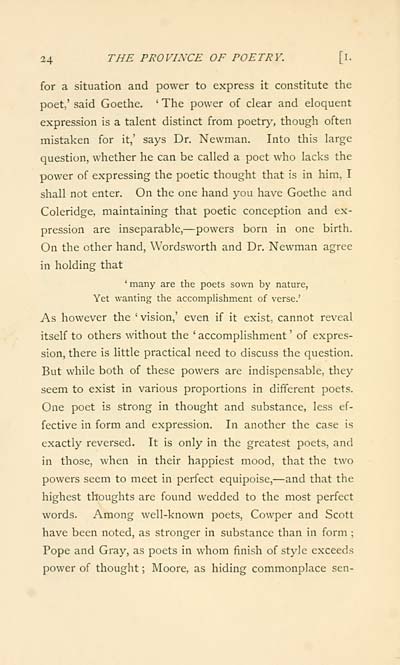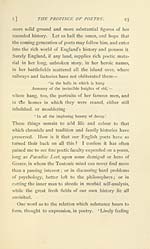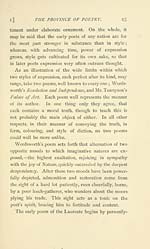Download files
Complete book:
Individual page:
Thumbnail gallery: Grid view | List view

24 THE PROVINCE OF POETRY. [l.
for a situation and power to express it constitute the
poet,' said Goethe. ' The power of clear and eloquent
expression is a talent distinct from poetr>% though often
mistaken for it,' says Dr. Newman. Into this large
question, whether he can be called a poet who lacks the
power of expressing the poetic thought that is in him, I
shall not enter. On the one hand you have Goethe and
Coleridge, maintaining that poetic conception and ex-
pression are inseparable, — powers born in one birth.
On the other hand, Wordsworth and Dr. Newman agree
in holding that
' many are the poets sown by nature.
Yet wanting the accomplishment of verse.'
As however the 'vision,' even if it exist, cannot reveal
itself to others without the ' accomplishment ' of expres-
sion, there is little practical need to discuss the question.
But while both of these powers are indispensable, they
seem to exist in various proportions in different poets.
One poet is strong in thought and substance, less ef-
fective in form and expression. In another the case is
exactly reversed. It is only in the greatest poets, and
in those, when in their happiest mood, that the two
powers seem to meet in perfect equipoise, — and that the
highest thoughts are found wedded to the most perfect
words. Among well-known poets, Cowper and Scott
have been noted, as stronger in substance than in form ;
Pope and Gray, as poets in whom finish of style exceeds
power of thought ; Moore, as hiding commonplace sen-
for a situation and power to express it constitute the
poet,' said Goethe. ' The power of clear and eloquent
expression is a talent distinct from poetr>% though often
mistaken for it,' says Dr. Newman. Into this large
question, whether he can be called a poet who lacks the
power of expressing the poetic thought that is in him, I
shall not enter. On the one hand you have Goethe and
Coleridge, maintaining that poetic conception and ex-
pression are inseparable, — powers born in one birth.
On the other hand, Wordsworth and Dr. Newman agree
in holding that
' many are the poets sown by nature.
Yet wanting the accomplishment of verse.'
As however the 'vision,' even if it exist, cannot reveal
itself to others without the ' accomplishment ' of expres-
sion, there is little practical need to discuss the question.
But while both of these powers are indispensable, they
seem to exist in various proportions in different poets.
One poet is strong in thought and substance, less ef-
fective in form and expression. In another the case is
exactly reversed. It is only in the greatest poets, and
in those, when in their happiest mood, that the two
powers seem to meet in perfect equipoise, — and that the
highest thoughts are found wedded to the most perfect
words. Among well-known poets, Cowper and Scott
have been noted, as stronger in substance than in form ;
Pope and Gray, as poets in whom finish of style exceeds
power of thought ; Moore, as hiding commonplace sen-
Set display mode to: Large image | Transcription
Images and transcriptions on this page, including medium image downloads, may be used under the Creative Commons Attribution 4.0 International Licence unless otherwise stated. ![]()
| Early Gaelic Book Collections > Ossian Collection > Aspects of poetry > (40) |
|---|
| Permanent URL | https://digital.nls.uk/78385752 |
|---|
| Description | Selected books from the Ossian Collection of 327 volumes, originally assembled by J. Norman Methven of Perth. Different editions and translations of James MacPherson's epic poem 'Ossian', some with a map of the 'Kingdom of Connor'. Also secondary material relating to Ossianic poetry and the Ossian controversy. |
|---|
| Description | Selected items from five 'Special and Named Printed Collections'. Includes books in Gaelic and other Celtic languages, works about the Gaels, their languages, literature, culture and history. |
|---|

